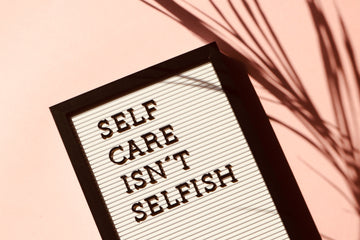May is Mental Health Awareness Month and even though one in five Americans struggle with mental health, there is often still a negative stigma surrounding mental health. In reality, a mental health challenge is anything that affects thinking, emotions, behaviors, or mood. This can be anything from a bad day at work to the loss of a loved one and it is completely normal to struggle no matter how big or small. Every person’s mental health journey is different but here are five small changes that can help improve your mental health either during a tough time or as a daily practice.
1. Find things that bring you joy
Laughter and happiness have been proven to decrease stress and increase feelings of self-confidence. While this sounds simple, it can sometimes be harder than we think, so it can’t hurt to start developing finding joy as a daily practice.
As a first step, try to make a list of things that make you happy. This can be anything from calling a friend, taking a warm bath, cooking, reading a book, listening to music, going for a walk, etc. Keep this list somewhere that you can easily access and anytime you are struggling, pull out the list and choose to do something on it that feels good at that moment.
2. Connect with others
It is very common for us to want to isolate ourselves when we aren’t feeling great mentally, but in reality, this can make us feel even worse. Studies have shown that socializing not only helps overcome feelings of loneliness but it also helps sharpen memory and cognitive skills, increases your sense of happiness and well-being, and may even help you live longer.
Whether it is calling a family member, grabbing coffee with a friend, joining a gym or club, or doing volunteer work, try to find a way to connect with other like minded people. It’s good for your mental and physical health!
3. Practice Gratitude
Another way to avoid getting stuck in negative thinking is by focusing on feeling grateful for the good things in your life. Scientists studying positive psychology found that a one-time act of thoughtful gratitude produced an immediate 10% increase in happiness and 35% reduction in depressive symptoms. In addition, regular gratitude journaling has been shown to result in 5% to 15% increases in optimism and 25% increased sleep quality.
As a starting point, commit to making a list of three things you are grateful for every single day. If you need a little bit of guidance, there are a ton of great gratitude journals that will help guide your gratitude practice until you get the hang of it!
4. Move your body
Researchers found that a person has an average of 3.4 poor mental health days per month but among those who exercise, the number of poor mental health days dropped by more than 40 percent. In addition, being physically active can reduce stress and tension, improve your mood, and so much more.
When we think of physical activity most of us think of running or high intensity exercise but moving your body can be anything from going for a walk, playing with your kids, or taking the stairs instead of the elevator.
According to the Mayo Clinic, doing 30 minutes or more of exercise a day for three to five days a week may significantly improve depression or anxiety symptoms. If that seems like a lot, don’t worry. As little as 10 to 15 minutes of physical activity at a time can also make a difference, so start small and work your way up if you need to!
5. Don’t be afraid to ask for help
If you think you may have a mental health challenge, remember you are not alone. It is completely normal to seek out mental health professionals. There are many virtual and local support options available. For more information, check out https://up2sd.org/resources or https://www.mentalhealthfirstaid.org/mental-health-resources/.
References:










